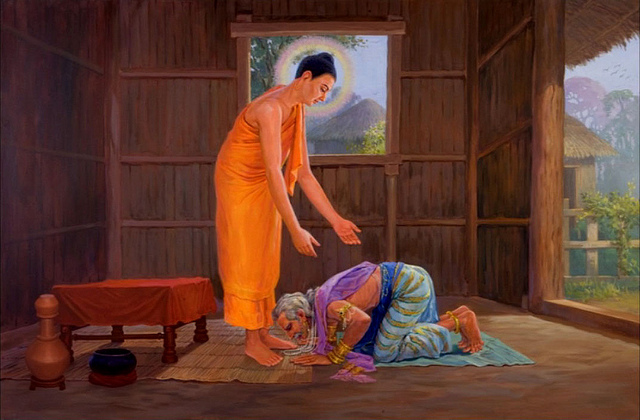What is the difference between reaction and response?
There is much, a lot of difference, not only in quantity but quality. A reaction is out of the past, a response is out of the present. You react out of the past old patterns.
Somebody insults you: suddenly the old mechanism starts functioning. In the past people have insulted you and you have behaved in a certain way; you behave in the same way again. You are not responding to this insult and this man; you are simply repeating an old habit. You have not looked at this man and this new insult – it has a different flavor – you are just functioning like a robot. You have a certain mechanism inside you: you push the button, you say, this man has insulted me – and you react; the reaction is not to the real situation, it is something projected. You have seen the past in this man.
Mind is all your beliefs collected together. Openness means no-mind; openness means you put your mind aside and you are ready to look into life again and again in a new way, not with the old eyes. The mind gives you the old eyes, it gives you again ideas: “Look through this.” But then the thing becomes colored; then you don’t look at it, then you project an idea upon it. Then the truth becomes a screen on which you go on projecting.
Look through no-mind, look through nothingness — shunyata. When you look through no-mind your perception is efficient, because then you see that which IS. And truth liberates. Everything else creates a bondage, only truth liberates.
In those moments of no-mind, truth starts filtering into you like light. The more you enjoy this light, this truth, the more you become capable and courageous to drop your mind. Sooner or later a day comes when you look and you don’t have any mind. You are not looking for anything, you are simply looking. Your look is pure. In that moment you become avalokita, one who looks with pure eyes. That is one of the names of Buddha — Avalokita: he looks with no ideas, he simply looks.
It happened; Buddha was sitting under a tree talking to his disciples. A man came and spat on his face. He wiped it off and he asked the man: “What next? What do you want to say next?”
The man was a little puzzled because he himself never expected that when you spit on somebody’s face he will ask, Now, what next? He had had no such experience in his past. He had insulted people, and they had become angry, and they had reacted; or if they were cowards and weaklings they had smiled, trying to bribe the man.
But Buddha was like neither; he was not angry, nor in any way offended, nor in any way cowardly, but just matter of fact; he said, “What next?” There was no reaction on his part. Now this is Buddha’s vision — without mind. He looks into the man: “What is the matter?
His disciples became angry, they reacted. Buddha’s closest disciple, Anand, said, “This is too much, and we cannot tolerate it; you keep your teaching with you, and we will just show this man that he cannot do what he has done. He has to be punished for it. Otherwise, everybody will start doing things like this.”
Buddha said, “You keep silent. He has not offended me, but you are offending me. He is new, a stranger, and he may have heard something about me from somebody, has formed some idea, a notion of me. He has not spat on me, he has spat on his notion, his idea of me, because he does not know me at all so how can he spit on me? He must have heard from people something about me – that this man Buddha is an atheist, a dangerous man who is throwing people off their track, a revolutionary, a corrupter – he must have heard something about me, he has formed a notion, an idea; he has spat on his own idea.”
“If you think on it deeply,” Buddha said, “he has spat on his own mind. I am not part of it, and I can see that this poor man must have something else to say – because this is a way of saying something; spitting is a way of saying something. There are moments when you feel that language is impotent: in deep love, in intense anger, in hate, in prayer; there are intense moments when language is impotent. Then you have to do something – when you are in deep love you kiss the person or embrace the person. What are you doing? You are saying something. When you are angry, intensely angry, you hit the person, you spit on him – you are saying something. I can understand him. He must have something more to say, that’s why I’m asking, ‘What next?’”
The man was even more puzzled.
And Buddha said to his disciples, “I am more offended by you because you know me and you have lived for years with me and still you react.”
Puzzled, confused, the man returned home. He could not sleep the whole night. It is difficult, when you see a Buddha, it is difficult to sleep again the way you used to sleep before. Impossible. Again and again, he was haunted by the experience, he could not explain it to himself, what had happened. He was trembling all over and perspiring, he had never come across such a man; he had shattered his whole mind and his whole pattern; his whole past.
Next morning he was back there. He threw himself at Buddha’s feet. Buddha asked him again, “What next?”
This too is a way of saying something that cannot be said in language. When you come and touch my feet you are saying something which cannot be said ordinarily, for which all words are a little narrow, it cannot be contained in them.
Buddha said, “Look, Anand. This man is again here, he is saying something. This man is a man of deep emotions.”
The man looked at Buddha and said, “Forgive me for what I have done yesterday.”
Buddha said, “Forgive? But I am not the same man to whom you did it. The Ganges goes on flowing. It is never the same Ganges again. Every man is a river. The man you spat upon is no more here. I look just like him but I am not the same; much has happened in these twenty-four hours! The river has flowed so much. Only in appearance I look the same. So, I cannot forgive you because I have no grudge against you. And you also are new. I can see you are not the same man who came yesterday, because that man was angry. He was anger, he spat – and you are bowing at my feet, touching my feet, how can you be the same man? You are not the same man! So let us forget about it; those two – the man who spat and the man on whom he spat – both are no more. Come closer, let us talk of something else.”
This is RESPONSE.
Reaction is out of the past. If you react, out of old habits, out of mind, then you are not responding. To be responsive is to be totally alive in this moment, here-now.
Response is a beautiful phenomenon, it is life; reaction is dead, ugly, rotten, it is a corpse. Ninety-nine per cent of the time you react, and you call it response. Rarely it happens in your life that you respond, but whenever it happens you have a glimpse, whenever it happens the door to the unknown opens.
Osho, Tao: The Three Treasures – Talks on fragments from Tao Te Ching by Lao Tzu, Volume 3, Ch 10, Q 2 (excerpts)
Osho: The Heart Sutra Chapter #10 Chapter title: Sannyas: Entering the Stream Q 1. (excerpts)
बुरा बुरे के अलावा भला भी होता है
हर आदमी में कोई दूसरा भी होता है …………..अनवर शऊर
burā bure ke alāva bhalā bhī hotā hai
har aadmī meñ koī dūsrā bhī hotā hai ………….ANWAR SHUOOR
Besides the bad, there is also good,
In every person, there is someone else too.
Buddha’s equanimity and inner peace is beyond any ordinary human measure. It is a state that transcends typical reactions and shows the power of inner mastery. This sentiment mirrors beautifully with the song from the Hindi film Aarti (1962), “Ab kya misaal doon main tumhare shabab ki…” In this song, the lover is rendered speechless by the beauty and grace of the beloved, finding that no comparison or example can do justice to what they see. There is an almost reverential admiration here, as if the beloved’s presence transcends anything the man has known or can express.
This song is written by Majarooh Sultanpuri, sung by legendary singer Mohammed Rafi and Music by Roshan.


Your thoughtful exploration of the difference between reaction and response offers deep insight into the nature of mindfulness and presence. The way you tie the wisdom of Buddha to the transformative power of awareness and equanimity is truly inspiring. It’s a beautiful reminder that true responsiveness comes from a place of inner peace and clarity, not conditioned patterns. Your words have the power to encourage profound introspection and self-awareness. Congratulations on such a brilliant and insightful piece!
As usual awesome.
The difference between reaction and response was not much in my mind till I read this enlightening blog. True, reaction is what the disciples gave by letting the insult affect their mind. Response is what Buddha gave without losing tranquility and by going deeper into the psyche of the offending person. Also, His analysis about how both of them were different people from what they were the day before is brilliant! Truly, Buddha is beyond compare🙏
This is great article !
Like the ganges river flow, much as said about response and react.
As a student of spiritually, I have practiced and self a-firmed, I will respond and now react. It has worked and yet I go back to reacting, after a time I respond. It a balance we need to achieve.
There is so much in us, in spite of practice and high awareness to respond and not reach, we tend to react. The way to move from react to respond is a process, it needs erasing of impressions (samskara) cleaning of the aura, being a happy person, diluting and removing the in happy person in us and cleansing of the mind. The mind and heart has to flow, and not be hard with impressions..